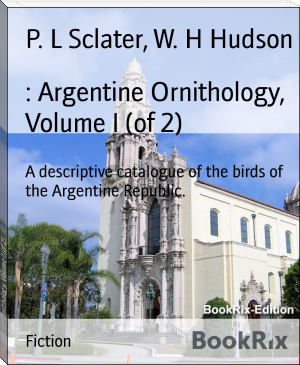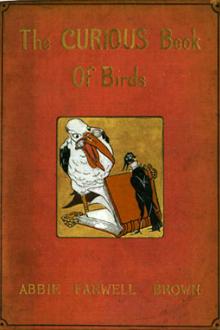: Argentine Ornithology, Volume I (of 2), P. L Sclater, W. H Hudson [best authors to read txt] 📗

- Author: P. L Sclater, W. H Hudson
Book online «: Argentine Ornithology, Volume I (of 2), P. L Sclater, W. H Hudson [best authors to read txt] 📗». Author P. L Sclater, W. H Hudson
(Catamarca).
_Description._--Above, head all round, neck, and wing-coverts grey;
back and upper tail-coverts olive-green; wings and tail black;
beneath, throat grey, breast and belly yellow, washed with olive;
crissum and under tail-coverts white; bill and feet black: whole
length 6·0 inches, wing 3·5, tail 2·3. _Female_: above obscure
olive-green, below yellow.
_Hab._ Chili and Western Argentina.
Burmeister says that this Chilian species is found in the valleys of the
Sierras near Mendoza.
67. PHRYGILUS CANICEPS (Burm.). (GREY-HEADED FINCH.)
+Phrygilus caniceps+, _Burm. La-Plata Reise_, ii. p. 487; _Durnford,
Ibis_, 1878, p. 393 (Chupat); _Barrows, Bull. Nutt. Orn. Cl._
viii. p. 130 (Sierra de la Ventana).
_Description._--Above, head, neck, wing- and upper tail-coverts grey;
back olivaceous yellow, washed with red; wing and tail-feathers
black, edged with grey; beneath, throat grey, breast and belly
orange-yellow; crissum and under tail-coverts white; bill
horn-colour; feet light brown: whole length 6·8 inches, wing 3·6,
tail 2·9.
_Hab._ Argentina.
Of this species, discovered by Dr. Burmeister near Mendoza, Mr. Barrows
writes:--"Only met with on the Sierra de la Ventana, where it was
abundant in flocks, some of which numbered as many as a hundred
individuals. When found near the base of the sierra they were almost
always associated with the common _Zonotrichia_. Although most of them
had not finished moulting, they were constantly singing, and seemed
perfectly contented with their desolate surroundings."
68. PHRYGILUS DORSALIS, Cab. (RED-BACKED FINCH.)
+Phrygilus dorsalis+, _Cab. Journ. f. Orn._ 1883, p. 109.
_Description._--Ashy grey; back rusty red; wing-coverts blackish;
chin, lower belly, and crissum whitish: whole length 6·5 inches,
wing 3·7, tail 2·6.
_Hab._ Tucuman.
Schulz discovered this species on the Cerro Vayo of Tucuman, near the
snow-line. It reminds one of the North-American species of _Junco_ in
its coloration.
69. PHRYGILUS UNICOLOR (d'Orb. et Lafr.). (SLATY FINCH.)
+Phrygilus unicolor+, _Scl. et Salv. Nomencl._ p. 31; _Cab. J. f. O._
1878, p. 195 (Cordova). +Phrygilus rusticus+, _Burm. La-Plata
Reise_, ii. p. 487 (Mendoza).
_Description._--Above nearly uniform slaty grey, below paler, whiter
on the middle of the belly; bill dark horn-colour, feet clear brown:
whole length 6·0 inches, wing 3·6, tail 2·6. _Female_ cinereous,
with blackish shaft-spots above and below; paler on the middle of
the belly.
_Hab._ Andes of Colombia, Ecuador, and Peru; Chili, Bolivia, and
Northern Argentina.
70. PHRYGILUS FRUTICETI (Kittl.). (MOURNING FINCH.)
+Phrygilus fruticeti+, _Burm. La-Plata Reise_, ii, p. 487 (Cordillera
of Mendoza); _Scl. et Salv. Nomencl._ p. 31; _Hudson, P. Z. S._
1872, p. 537 (Rio Negro); _Durnford, Ibis_, 1878, p. 393
(Chupat); _Döring, Exp. al Rio Negro, Zool._ p. 39 (R. Colorado,
Negro). +Emberiza luctuosa+, _Eyd. et Gerv. Mag. de Zool._,1836, _Ois_, pl. 72.
_Description._--Grey, with minute black markings on the head and
neck, and broader stripes on the back; greater coverts and wings
black, the feathers edged with grey, and a band of white spots
across the coverts; tail black; beneath, throat, and upper part of
breast black, many feathers tipped with grey, giving the chest a
mottled appearance; lower part of breast and belly grey, mottled
below the chest with a few black spots; centre of abdomen and under
tail-coverts white; beak yellow; feet flesh-colour: total length 7·3
inches, wing 4·0, tail 3·2. _Female_ obscure grey and without the
black colour on the throat and chest.
_Hab._ Peru, Bolivia, Chili, and Argentine Republic.
This Finch is common on the western slopes of the Andes as far north as
Peru; it is also found in the Mendoza district and throughout Patagonia.
It is very abundant on the Rio Negro, especially in the immediate
neighbourhood of the Carmen settlements, for, like the Chingolo and
other fringilline species, it is beneficially affected by cultivation.
Though not possessing any bright tints, it is a very charming bird,
tuneful, elegant in form, graceful and buoyant in its motions. When
approached it utters a series of low ticking sounds, and at intervals a
peculiar long squealing note. The song of the male is very agreeable,
and curiously resembles that of the Cachila Pipit (_Anthus correndera_).
It usually sits on a twig near the ground, and at intervals soars up
to a height of ten or twenty yards, and utters its song while gliding
slowly downwards with depressed wings and outspread tail. It sings
throughout the year; in bright weather its notes are heard all day long,
but on cold, cloudy, or wet days only after sunset. In the warm season
they live in pairs, and in the autumn unite in flocks of as many as two
or three hundred individuals, and have a strong undulating flight.
71. PHRYGILUS CARBONARIUS (d'Orb. et Lafr.). (BLACKISH FINCH.)
+Phrygilus carbonarius+, _Burm. La-Plata Reise_, ii. p. 487; _Döring,
Expl. al Rio Negro, Zool._ p. 38.
_Description._--Above grey, with brownish-black stripes; wings dusky
brown; tail-feathers black; below black, with minute grey marks on
the throat and bosom; sides dull grey: total length 5·5 inches, wing
2·9, tail 2·2.
_Hab._ Bolivia, Argentina, and Patagonia.
This species is said to be about one third less than _Phrygilus
fruticeti_ in size, but to resemble it closely in colour. Dr. Döring
found it abundant in Patagonia between the rivers Colorado and Negro,
where it was seen during the cold season in flocks, associating with
_Zonotrichia canicapilla_. Burmeister met with it in the Sierra de
Uspallata, near Mendoza.
72. GUBERNATRIX CRISTATELLA (Vieill.). (YELLOW CARDINAL.)
+Gubernatrix cristatella+, _Burm. La-Plata Reise_, ii. p. 482
(Paraná); _Scl. et Salv. Nomencl._ p. 31; _White, P. Z. S._ 1883,
38 (Cordova); _Barrows, Bull. Nutt. Orn. Cl._ viii. p. 130(Concepcion, Entrerios).
_Description._--Above light olive-green, the back marked with a few
black stripes; four middle tail-feathers black, edged with olive,
all the rest of the tail-feathers bright yellow, tipped with dull
olive; broad superciliaries and lower part of the head bright
yellow; crown, crest, and throat velvet-black, the black extending
to the chest; beneath yellow, washed with olive-green on the breast
and sides; bill and feet black: total length 8·0 inches, wing 3·8,
tail 3·7. _Female_ less brightly coloured; white on the head where
the male is yellow; breast grey.
_Hab._ Paraguay and Argentine Republic.
The Yellow Cardinal is a graceful sprightly bird, with a strong
melodious voice, and is one of our favourite cage-birds. It visits
Buenos Ayres in small flocks in spring, but is a rare bird with us.
There is little variety in its song, which is composed of four or five
mellow notes of great power, and in tone somewhat like the whistle of
the Blackbird of Europe.
73. DIUCA GRISEA (Less.). (DIUCA FINCH.)
+Diuca vera+, _Burm. La-Plata Reise_, ii. p. 483 (Mendoza). +Diuca
grisea+, _Scl. et Salv. Nomencl._ p. 31.
_Description._--Above grey, sides of head darker; wings and tail
blackish, edged with grey; lateral rectrices tipped with white;
below grey, whole chin and throat and middle of the belly white;
lower flanks and crissum stained with rufous; bill plumbeous; feet
dark hazel: whole length 6·3 inches, wing 3·3, tail 2·6. _Female_
similar, but tinged with brownish, and colours more obscure.
_Hab._ Chili and Western Argentina.
This well-known Chilian species is said by Burmeister to be not
unfrequent near Mendoza and along the range of the Cordilleras.





Comments (0)